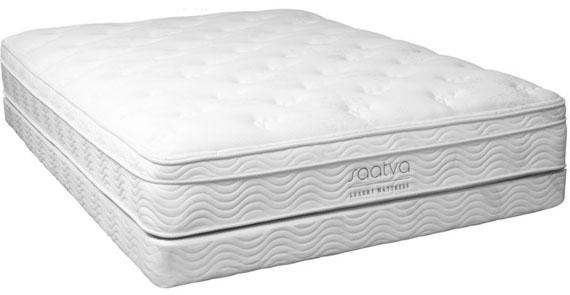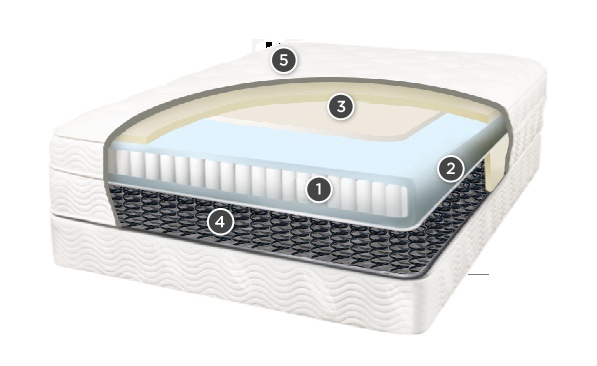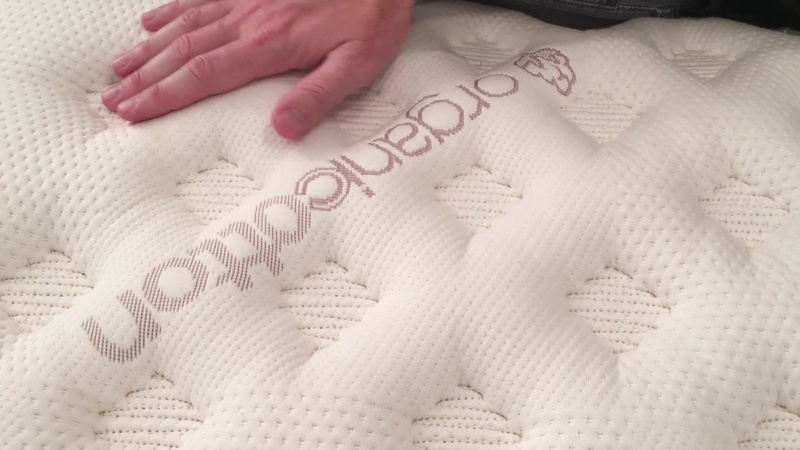Cover
Covering the Saatva mattress is a quilted pillowtop made partly of organic cotton. We tugged and crunched the pillowtop and found it to be well constructed and sturdy during our testing period.
GoodBed helps you find the best mattress for you, whether online or in a local store. If you choose to buy a product through the links on this site, we earn a small referral fee that supports our work at no cost to you. Here's more info about how it all works.
The Saatva mattress is a coil-on-coil innerspring mattress with a traditional construction that's available exclusively online, but how does it compare to mattress store brands, and is it a good fit for your needs? Read on to find out.

Founder of GoodBed, Leading Mattress Expert
The Saatva Mattress is an innerspring mattress using coil-on-coil construction. Two different coil layers—one interconnecting and one pocketed—respectively form the support and comfort layers of this bed. Surrounding the coils on all sides is a foam edge support, and the top includes a 3/8” memory foam lumbar support layer.
The mattress comes in three comfort variations: Plush Soft, Luxury Firm, and Firm, as well as in two heights: 11.5” and 14.5”. We reviewed the most popular model, the 14.5” Luxury Firm.
In our evaluations, we found the Saatva mattress to have a Medium Firm softness level, with good overall pressure relief and exceptional back support for our tester. The combination of the connected coils (for support and longevity) along with pocket springs (for responding to the body’s movements) provided excellent spinal alignment, particularly for back sleepers, along with very good support for those who enjoy stomach sleeping.
One notable characteristic is this mattress’s bounce; for those who like that springy feel (as opposed to the sinking/melting feel of memory foam), the Saatva performed very well in our test, springing back quickly.
The Saatva mattress also excelled in our tests for ease of repositioning. Changing sleeping positions was virtually effortless for our tester, so if you tend to move around a lot while sleeping, the Saatva mattress deserves close consideration.
Among our concerns: While motion isolation overall was very good with our bowling ball test (our standing bowling pin wiggled but did not fall), it was not as positive with our human tester (the pin quickly fell). In practical terms that means the Saatva mattress may not be ideal for those who are easily disturbed by a partner that repositions frequently. And while our tester experienced excellent back support, the Saatva mattress may be less suited for those who prefer a very soft mattress and like to feel they are sinking in or being cradled by their bed.
Lastly, while our tester experienced excellent support overall, we question whether heavier individuals (250 lbs+) will experience the same effect, as they may compress the spring substantially more. Those individuals might opt for the Firm version of the mattress, which has higher-gauge (stronger) steel coils.
The Saatva mattress’s price is very competitive; free shipping is included, along with in-home setup and removal of your old bedding, a “white glove” service that typically costs $100+ extra with other brands. The 180-day trial period should give shoppers some peace of mind but note that returning the bed invokes a $99 service fee for pickup. (Saatva delivery options)
You can place the Saatva mattress atop the support of your choice, including a separately purchased box support, a bed frame, platform bed, or adjustable bed frame (only for the 11.5” version of the mattress). The company sells it’s own foundations, along with the Saatva adjustable foundation for the 11.5” version of the mattress.
Overall, the Saatva mattress performed well in our testing and evaluation for pressure relief, back support, and heat transfer. It was exceptionally easy to change sleeping positions, and we deemed edge support to also be a cut above. We judged construction to be of good quality, and the brand includes some eco-friendly features.
Read on for our detailed report and be sure to check out the video to see this mattress in action as we put it through our tests.
Note: The flagship Saatva mattress reviewed here is a coil-on-coil innerspring mattress. The company also sells the Loom & Leaf memory foam bed, as well as the Zenhaven latex mattress brand, both of which we have also reviewed.

The “feel” characteristics of a mattress cannot be universally better or worse. They can only be more or less desirable to you, based on your personal preferences. For this reason, we call these “preference-based” attributes. Our ratings here are based on objective measurements that we apply to a consistent scale for products from all brands.
Keep in mind that what mattress companies call “firm” or “soft” is a purely a preference. All mattresses should be supportive and promote healthy spinal alignment. Whether a mattress is fluffy and squishy (what mattress companies call soft or plush), or less so (what companies call firm), is purely down to your personal needs and preferences.
The Saatva mattress is available in three comfort levels (from softest to firmest): Plush Soft, Luxury Firm, and Firm. The company tells us that 80% of their customers choose the Luxury Firm version, so this is the model we tested for this review. We class this mattress as Medium Firm.
Each of the three versions comes in two height variations, 11.5” and 14.5”. There’s no difference in comfort between the two heights; it’s purely an aesthetic choice whether you prefer a taller mattress.
Not sure what softness is best for you? Take our Mattress Match Quiz and find out.
Much of the ‘sinking in’ feeling of the Saatva mattress comes from the pillow-top cover, which has deep contours and quilting. When we placed our 16-pound bowling ball atop the mattress, it sunk down quite deeply, more deeply than an average innerspring mattress.
When our 200-pound tester laid on the mattress, however, we noted cushioning depth as closer to average; where compressed, the slope of the mattress to the body was gradual, giving a feeling of floating on top of the mattress more than sinking deeply into it. Overall, we class cushioning depth as medium.

Compared to a memory foam mattress, innerspring mattresses are general very responsive. Instead of a slow, melting into the bed feeling, the coils spring back into place very quickly. The Saatva mattress does have a very small amount of memory feel, but it's not enough to give you much of that melting into the bed feeling associated with a memory foam mattress.
You can see this demonstrated in our video when we toss our bowling ball on the Saatva mattress; it bounces several times before coming to rest. Our tester dropped onto the Saatva bed with a similar result, bouncing three or four times before coming to rest.
This springiness and bounce is characteristic of innerspring mattresses, so if you like that feeling, you’ll probably appreciate the Saatva bed.
You can see this demonstrated in our video when we toss our bowling ball on the Saatva mattress; it bounces several times before coming to rest. Our tester dropped onto the Saatva bed with a similar result, bouncing three or four times before coming to rest.
This springiness and bounce is characteristic of innerspring mattresses, so if you like that feeling, you’ll probably appreciate the Saatva bed.
The key to good back support is for the mattress to support your spine in a “neutral” position while you sleep, meaning that the shape of your spine is roughly the same as when you're standing. The ability of any given mattress to do this will vary by sleeper, depending on its “fit” for your weight, body shape, and preferred sleep position(s).
Overall, we thought the Saatva mattress offered very good support, especially for those who sleep primarily on their backs. We were especially curious to explore whether the Saatva’s foam lumbar pad (read about how Saatva intends it to work) made a difference, and we were surprised that it did—our tester could feel the mattress reaching up to support the lower back. In our view, back support would also be good for those lighter than our tester, as well as those slightly heavier. Much heavier individuals (over 250 lbs) might want to opt instead for the Firm version of the Saatva mattress rather than the Luxury Firm model we tested. But overall, we felt back support and spinal alignment in the back position to be very good.
Lying in the stomach position also felt very supported for our 200-lb tester, who noted that his back was not being pushed into an over-arching situation. Those who are lighter and slightly heavier should experience the same, while again, those who are over 250 lbs might want to opt for the Firm version of the mattress so that its stronger springs will push back and support a heavier person.
For side sleeping, our tester felt that his shoulders didn’t sink quite enough into the mattress, forcing the upper spine to curve up a bit. If you are primarily a side sleeper, or if you are lighter than our tester, going for the Plush Soft version of the Saatva mattress should provide a bit more depth for shoulders and hips to sink.
The key to good back support is maintaining proper spinal alignment while you sleep. This means that the mattress should hold your spine in roughly the same position it's in when you're standing. The ability of a given mattress to do this will generally depend on your weight, sleep position, and body shape.
Here is how we break down the spinal alignment of the Saatva mattress:
Our 200-pound tester felt very well supported while on his back, with very good spinal alignment and lumbar support, helped in part by the Saatva mattress’s 3/8” foam lumbar pad. Lighter and slightly heavier people should have a similar experience, while those over about 250 lbs might want to choose the Firm version of the mattress instead.
Spinal alignment for our tester in the side position was good, noting that his shoulders could have sunk in a bit more. As a result, the top part of his spine was forced to curve slightly. While that might not be a major issue for most people, those who sleep primarily on their sides might want to explore other mattresses.
The pocket springs of the Saatva mattress are primarily responsible for spinal alignment, so lighter people might want to choose the Plush Soft version of the mattress, as their lighter weight might not compress the coils enough on firmer versions.
Achieving good spinal alignment for stomach sleepers can often be trickier as the hips can tend to sink down too far with some mattresses, but our tester felt well supported in this position, and his back was not forced to over-arch. Lighter and somewhat heavier individuals should have a similar experience. Overall, we felt that the Saatva mattress is a solid choice for those who spend a lot of sleep time on their stomachs. Again, those over about 250 lbs. might instead choose the Firm version of the Saatva bed to better support hips with stronger coils.

Inadequate pressure relief from your mattress results in “pressure points,” which can be a source of pain, soreness, loss of circulation, restlessness, and other problems. Pressure relief requirements will vary be sleeper, with side sleepers needing the most. Likewise, the amount of pressure relief that a given mattress provides will also vary by sleeper, depending on its “fit” for your weight and body shape.
Overall, we found the pressure relief offered by the Saatva mattress to be good, particularly for average-to-heavy individuals. Our tester didn’t ever feel like he was going to ‘bottom out’ on this mattress because of the lower level of supportive connected coils. Lighter people (less than 150 pounds), and especially lighter people who are quite curvy, might opt for the Plush Soft version to be sure their body can compress the coils more easily.
With the “features” of a mattress, performance will tend to be consistent across all sleepers – without regards to your body type or preferences. However, these attributes have differing levels of importance to each sleeper, which is why we consider them “priority-based” characteristics.
With a bowling pin standing upright on the Saatva Luxury Firm bed, we tested motion isolation by dropping a 16-lb. bowling ball on it; the bowling pin wiggled a bit, but never toppled over. However, when our 200-lb. tester dropped his weight onto the bed, the bowling pin did fall.
In general, innerspring mattresses are not the best choice if motion isolation is a top priority. That’s because the bed’s lower-level connected springs distribute compression across the bed. The middle pocket springs do help somewhat with motion isolation, but not to the degree that a memory foam or latex mattress might provide. If not feeling your partner’s movements on the bed is a high priority, we suggest a closer look at those other mattress types versus innerspring.
If you are a “hot” sleeper, or perhaps a woman who experiences hot flashes, how a mattress affects your body temperature may be a concern. Innerspring mattresses in general do not tend to feel hot; the very nature of the spring construction means there’s lots of airflow between construction materials. Furthermore, with the Saatva mattress, cushioning depth is not overly deep, so you are unlikely to feel smothered or trapped in the quilted top layer.
If you like to sit on the edge of your mattress, or if you tend to sleep right on the edge of your mattress, you want a model that has good integrity and stability around the edges. To that end, the Saatva mattress is encased in foam all along the edges.
In our tests, which you can see in our video review above, our tester was able to sit very comfortably on the side of the mattress with minimal compression. Laying right along the side of the mattress also felt very stable. Overall we felt that the Saatva bed would be a very good choice if edge support is a priority for you.

One of the highlights of the Saatva mattress, for our tester, was ease of movement; it was effortless to change positions or roll from side to side due to the responsiveness of the spring layers.
For mattress shoppers concerned with the use of natural materials, sustainable manufacturing practices or the like, we offer our subjective evaluation of any efforts taken by the company to make the mattress more green, healthy, or safe.
In the case of the Saatva mattress, we noted some confusion among Goodbed users. While the pillow-top cover does contain some organic cotton, the word “organic” printed on the fabric has led some consumers to believe that the entire mattress is made of organic materials; it is not, nor does the company make any claims that it is.
Similarly, the label of our test mattress included the words “eco-friendly,” and the company also uses this term on their website. While the company does use some plant materials in its foam, it’s still chemically processed. The foam is, however, certified to the Certi-PUR-US standard, which verifies that a material has low VOC off-gassing as well as a lack of chemicals and other substances regulated by the CPSC.
Furthermore, most of the mattress is comprised of steel coils, which won’t off-gas or impart any weird chemical smells. And the company does state that is uses recycled steel for the springs. And with more mattress made of air and springs than foam, the use of chemicals is minimized.
Overall, while the Saatva mattress is not made entirely of natural materials, the company does include some organic cotton in the cover, along with some plant-based foam, and recycled steel for the springs.
If you plan to use your mattress atop an adjustable base, the Saatva is a good choice. In fact, the company even sells its own adjustable base (optional), the Lineal. While we did not specifically test the mattress with an adjustable base, company materials say that using one with the 11.5” version of the mattress is perfectly fine and will not void your warranty. Be aware, however, that the 14.5” version of the Saatva bed should not be used with any adjustable base and doing so will void your warranty.
Mattress type: Micro-Coils over Connected Coils
Made In: United States
Mattress Thickness: 11.5" and 14.5"
Mattress Weight: 110-120 pounds (queen size)
Overall, we classify the Saatva mattress as a "Micro-Coils over Connected Coils" construction type. This innerspring mattress available in two versions, 11.5” or 14.5.” The difference is purely aesthetic as construction for both is similar. Note however, that the 14.5" version is NOT compatible with an adjustable base.
The Saatva mattress is mainly constructed of two types of steel coils, with foam used principally for added comfort on top and enhanced edge support along the sides. Here are the layers of the Saatva mattress, listed from top to bottom:
The top of the mattress is a quilt package that is stitched together with the cover, giving the mattress a more traditional look and feel than many online mattresses. Directly underneath this, running across the center third of the mattress, is a 3/8” lumbar pad (#3 in the image below) made of memory foam, intended to impart extra back support. Below that is another 5/8" layer of soft foam.
The principal comfort layer of the mattress is its upper layer of individually-wrapped coils (a.k.a. pocket springs; #1 on the image below). In this layer, the springs compress independently from one another, allowing them to conform more closely to the body. For purposes of our classification system, we consider this layer to be "micro-coils," since they are tasked mainly with conformance, pressure relief, and the like (rather than underlying support). However, they are certainly on the tall side as micro-coils go — most micro-coils run 1-2" in height whereas these are a full 4" tall.
Around the edges of the micro-coil layer is firmer bio-based foam (made partly from soy; #2 on the image below). This offers some protection to the coils, and more importantly gives the mattress added edge support.
By contrast, the taller steel coils that form the bottom support layer of the mattress (#4 on the image below) are connected to each other; they work as unit in order to keep the mattress from being compressed too much in any particular area. This type of interconnected coil has a lot of bounce (we’ll talk more about bounce characteristics of this mattress later in the review).

Covering the Saatva mattress is a quilted pillowtop made partly of organic cotton. We tugged and crunched the pillowtop and found it to be well constructed and sturdy during our testing period.

The “value” of any mattress is both subjective and personal – reflecting how well it meets that person’s unique sleep needs and preferences, relative to their budget. As a result, our ratings in this area are focused on more objective factors like quality and longevity.
Prices shown are list prices. Remember that GoodBed keeps our site current with the best available discounts on online mattresses, many of which are exclusive discounts for our readers.
The Saatva is a traditional innerspring mattress that in our view, feels very similar to a high-end mattress you might see in a local store, with some extras. The coil-on-coil construction (1300 coils total in the queen size) gives you the best of both worlds; the support and longevity of interconnected coils, plus the motion isolation and support of the pocketed comfort-layer springs. We also felt that the company’s lumbar support foam was helpful, and its edge support foam was a real standout in comparison to its innerspring peers in this price range. We also judged construction quality and the quality of the pillow top to be excellent. It feels sturdy and substantial.
Lastly, the mattress has a few green touches, including some organic cotton in the cover, recycled steel for the coils, and some plant-based foam.
In general, innerspring mattresses have a good reputation for longevity; steel holds its integrity for a very long time. We feel the Saatva mattress is built to last, with the coil-on-coil construction particularly enhancing longevity.
One of the biggest, if not THE biggest complaints about any mattress from consumers regards body impressions — the inability of a mattress to spring back, eventually creating a low spot/sinkhole in the mattress. As such, mattress warranties all contain a term defining how big a sag or ‘body impression’ (measured when no one is on the mattress) is considered a defect, and thus covered under the warranty. The industry standard for mattresses is generally between ¾” and 1.5”. Saatva has chosen to cover indentations that meet or exceed 1”. Practically speaking, that means any softening or sagging would need to be at least that deep before the warranty would offer you protection.
For the first two years of ownership, Saatva will replace your mattress (including shipping) if it falls under warranty coverage. For years three through 15 of the warranty, the company will repair and re-cover your mattress, but customers are required to pay a $99 shipping charge each way ($298 total). See: Saatva warranty fine-print.
On the whole, especially if you are shopping for a more traditional innerspring mattress like you’d find in a local mattress store, the Saatva mattress represents good value. In it’s price range, we feel the Saatva bed compares exceptionally well to mattresses you’d find in a store and is a very good value.
When we first reviewed the Saatva mattress in our video above, there was a $99 delivery charge. The company has since changed its policy to include free shipping, free in-home setup, and free removal of your old bedding. This is a policy that now matches or exceeds that of the majority of Saatva’s online competitors.
Saatva offers buyers a 180-day trial period. Should you decide to return the mattress during that period, there is a $99 fee for pickup.
Some context: Many of today’s online mattress brands are memory foam mattresses, which can be highly compressed and packed into a relatively small box that’s easily delivered by a common carrier like UPS. However, the Saatva mattress is a piece of furniture, delivered by movers with a truck. You can see how returning this type of mattress is a more expensive proposition for a company (and ultimately for you). Even so, several of the company’s online competitors so offer free returns. Read more about the policy on the Saatva website.
Is the Saatva bed right for you? Take our Mattress Match Quiz to find mattresses that fit your needs, based on your preferences and price range.
Looking for more on the Saatva mattress? Visit Saatva.com.
|
How to Support GoodBed If you like the in-depth assessments and objective expertise that we provide in our reviews, please support our work by coming back to GoodBed.com whenever you're ready to buy – purchasing through most links on this site provides us with a small referral fee that supports our work at no cost to you. |